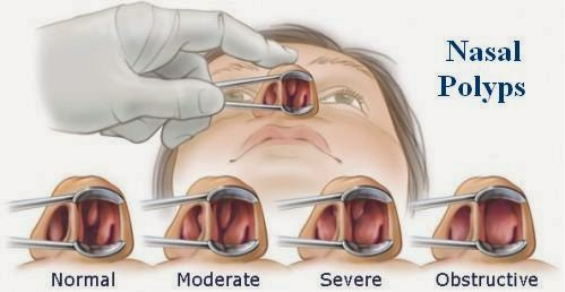Is Surgery Necessary for Nasal Polyps ?
What is Nasal Polyps ?
In 1990, Tos reported 10 pathogenic theories of nasal polyp formation. Multiple chemical mediators have been identified in nasal polyps but their significance has not been completely elucidated. Some of these mediators may be released by the polyps themselves and others by the eosinophils found in certain subsets of polyps. Cysteinyl leukotriene receptors and interleukin-5 (IL-5) appear to be the most well studied.
Patients with chronic allergic rhinitis; chronic sinusitis; and, less frequently, underlying disease, such as cystic fibrosis, may be at risk for the development of nasal polyps. Common presenting symptoms include nasal obstruction; chronic rhinosinusitis; exacerbation of asthma; and, infrequently, nasal and facial deformity. Nasal polyps have been associated with considerable morbidity, economic costs, and impairment in quality of life. When severe symptoms of obstruction and infection are refractory to medical treatment, surgical intervention may be required. In endoscopic sinus surgery, the goal is to remove diseased tissue and provide adequate sinus aeration in order to prevent recurrence.
Is Surgery Necessary for Nasal Polyps ?
But it's not necessary to surgery for Nasal Polyps. Nasal Polyps surgery can be carried out under local anesthesia with sedation or general anesthesia. Intraoperatively, extreme care must be exercised to avoid orbital and neurologic complications. The preoperative CT scan serves a vital role in proper evaluation of potential anatomic anomalies and changes due to disease process or anatomic variance.
Patients undergoing preoperative consultation must be informed of potential orbital complications, the possibility of postsurgical cerebrospinal fluid leakage, possible bleeding from related sinus arteries, and the possibility of polyp recurrence despite surgical removal. Patients should also be counseled regarding the need for close follow-up care and postoperative medical treatment for allergy, asthma, and other related medical conditions.
The following medical treatments are available :
-
Topical steroid inhaler
-
Topical antihistamine inhaler
-
Systemic steroids
-
Intranasal cromolyn treatment
-
Treatment and control of allergic rhinitis
-
Treatment of underlying sinusitis
Read more : How to Treat Nasal Polyps Permanently and Naturally at Home ?





Nhận xét
Đăng nhận xét